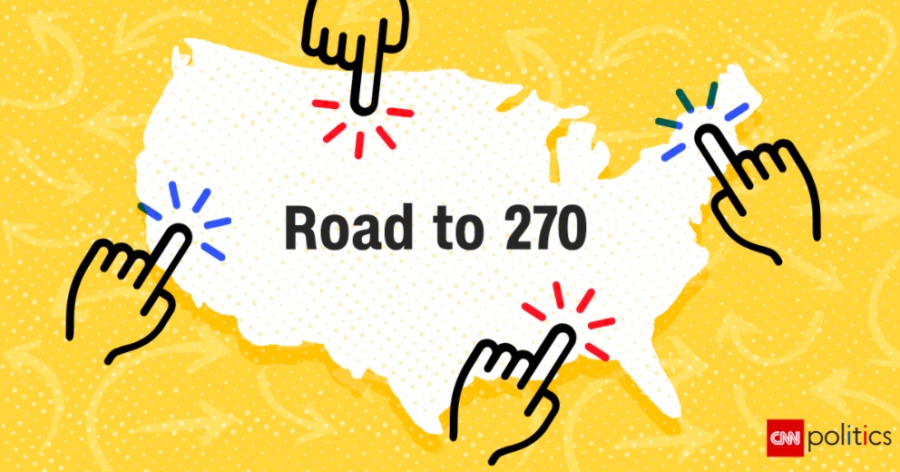Election Day 2020: The Race to 270
The 2020 election has been without a doubt one to remember. Over the past few months, we have seen two diametrically opposed candidates battle over the issues of healthcare, environmental protection, systemic racism, baseless conspiracy, and COVID 19 response. Now it is Election Day and the end is in sight and for many people across the country the biggest questions are who will win and what will this mean. To find out who will win we must look at the hand full of states that decided the election.
As most people know the presidential election is not decided by the popular vote, but rather by the electoral college (A system that gives each state a number of votes equal to the number of house members plus the number of senate members in that state.) To win the election, a candidate must win 270 electoral votes, or 50% of the electoral college. Most states generally vote the same way every time and are called blue (Democrat) or red (Republican) states depending on which way they vote, but some states, known as purple states or swing states, have very close races and may vote for a different party each election. Many people are speculating that Georgia, Texas, and Arizona may “turn blue” this year.
The electoral college was created by the framers of the US Constituion, and we need to get rid of it. The biggest problem with the electoral college is the fact that the candidates who lose the popular vote can still win by a comfortable margin in the electoral college. Over the last seven elections, Democrats have won the popular vote six times and we have had a Republican president win three of the elections. To me this is a flaw in our democracy and alone is grounds for ditching the electoral college. The second problem with the electoral college is the fact that the opinions of some Americans matter more than others. For instance, a Florida resident’s vote has more of an impact on the election than a California resident because Florida is a swing state and California is solidly blue. Also, states like Wyoming have more electoral votes per person than voters in California.
Wwhy do we still have this system? There are two answers to this question. One is tradition and the other is partisan politics. We have had the electoral college since George Washington was elected and for many people that is enough. To some, the fact that the founding fathers came up with this plan means that it must be as perfect as they were, which I tend to agree with. This to me is a ridiculous argument. The fact that something worked hundreds of years ago does not mean it is the perfect system now. If that were true, we would all still be dying of measles and horses would be the primary mode of transportation. The second reason is even less legitimate. It is the fact that Republicans are scared. They are scared that if the electoral college goes away, they will lose more elections, because they most likely will. The main reason we have as many Republicans in office as we do is not because their policies are more popular, it’s because they have gerrymandered districts so that it is easier for them to win.
If you are like me you are probably thinking, well great, the electoral college is horrible, but what can we do about it? The only answer I see is for politicians to put forth a constitutional amendment to replace the electoral college with a nationwide popular vote. The problem is to pass an amendment you need a supermajority in the House and Senate and for the amendment to be ratified by a majority of state governments. That will not happen any time soon. Fortunately, there is another way. There is a growing coalition of states that have promised to vote with the popular vote regardless of their own state’s decision. The agreement will only become active once enough states have signed on to hold a majority in the electoral college. We are nowhere near there, but in time our country may become just a little more democratic.
View CNN’s interactive and historic Electoral College maps to explore the votes needed to win the US presidential election: cnn.it/3oRwjSh
See you on the other side of this election, Warriors.



